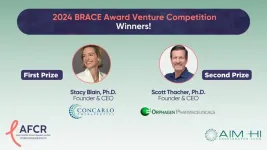(Press-News.org) Research Highlights:
A new study finds that up to 74% of participants with resistant or difficult-to-control high blood pressure, including those with chronic kidney disease, were able to improve control of their blood pressure within 12 months after using a Bluetooth-enabled remote monitoring system coupled with pharmacist interactions.
Two-thirds of patients had interacted with pharmacists who co-managed their blood pressure via telehealth, often making medication adjustments and addressing medication adherence, which was associated with greater improvement in blood pressure and fewer hospitalizations.
Note: The studies featured in this news release are research abstracts. Abstracts presented at the American Heart Association’s scientific meetings are not peer-reviewed, and the findings are considered preliminary until published as a full manuscript in a peer-reviewed scientific journal.
Embargoed until 8 a.m. CT/9 a.m. ET, Thursday, Sept. 5, 2024
CHICAGO, Sept. 5, 2024 — Up to 74% of adults with treatment-resistant high blood pressure were able to get their blood pressure below 140/90 mm HG within one year through a program combining remote blood pressure monitoring with pharmacist interactions, according to preliminary research presented at the American Heart Association’s Hypertension Scientific Sessions 2024. The meeting is in Chicago, September 5-8, 2024, and is the premier scientific exchange focused on recent advances in basic and clinical research on high blood pressure and its relationship to cardiac and kidney disease, stroke, obesity and genetics.
The study targeted patients with blood pressure higher than 140/90 mmHg who were receiving care in clinics specializing in kidney conditions. The ConnectedCare365 Hypertension Management program provided people in central and northeast Pennsylvania communities with remote blood-pressure monitoring and other devices that transmit information to doctors. Patients were identified and enrolled through a centralized monitoring center, known as ConnectedCare365, to ensure consistent messaging and ample education on the devices and patient communication application. Doctors and pharmacists assigned by the program co-managed patient care and helped adjust medications for patients.
“In our study, we developed a program that builds off what others have done using telemonitoring and pharmacists,” said senior study author Alexander Chang, M.D., M.S., a nephrologist and associate professor in the department of nephrology and the department of population health sciences at Geisinger Health in Danville, Pennsylvania. “By deploying these extra resources to get blood pressure under control in high-risk patients and reducing hospitalizations, we are hoping that we can help provide more justification in expanding these types of programs.”
Notifications from the home blood pressure-monitoring devices were transmitted to the central monitoring center. During the first six months of the program, the notifications were first transmitted to doctors in collaboration with pharmacists through a virtual platform that connected to patients’ phones through an app, which connected to the devices over Bluetooth. Blood pressure measurements were assessed and blood pressure medications were prescribed and/or adjusted accordingly. During the second six months, the notifications were transmitted first to pharmacists, who co-managed blood pressure through a collaborative telehealth practice agreement. While patients were enrolled in the program, they also had real-time access to a nurse during business hours through a live chat feature in the central monitoring center.
Study results include:
67% of patients were able to achieve blood pressure control of <140/90 mm Hg at six months, and 74% of patients were able to achieve blood pressure control by 12 months. The 2017 clinical guideline from the American Heart Association and the American College of Cardiology set the threshold for stage 1 hypertension at 130/80 mm Hg and the threshold for stage 2 hypertension at 140/90 mm Hg.
Systolic blood pressure was lowered by an average of 3.3 mm Hg/month for those with initial blood pressure readings greater than 150/90 mm Hg; lowered by 2.4 mmHg/month for those with initial readings in the range of 140-149/90-99 mm Hg; and lowered by 0.6 mm Hg/month for those with initial readings lower than 140/90 mm Hg.
Pharmacist telehealth encounters, in which the patients talked directly with pharmacists about hypertension management, were documented in 65% of patients, and pharmacist interactions were associated with a 1.3 mm Hg/month decline in systolic blood pressure over time.
During the 12-month study period, 46% of patients had a blood pressure medication adjustment, and 37% were prescribed new blood pressure medication.
Patients experienced fewer hospitalizations during the study period compared to the previous 12 months; however, there was no difference in the number of reported emergency department visits.
“We know that home blood pressure monitoring can be done by patients accurately and can really help engage patients in their own health. However, we also know that these self-measured blood pressure readings often do not make it back to patients’ health care team, therefore, delays in adjusting medications are very common. This type of physician-pharmacist collaborative model with home blood pressure monitoring that is centrally received and monitored by the care team can help address these issues,” Chang said.
Study background and details:
The study included 205 adults, with an average age of 62 years; 48% self-identified as women and 52% as men.
87% of participants self-identified as non-Hispanic white adults, 6% as Black adults; 5% as Hispanic adults, and 1.5% as “other” for race/ethnicity.
53% of participants had a diagnosis of chronic kidney disease at the time of enrollment.
Participants’ blood pressure was tracked for up to 6-12 months between March 2022 and May 2024 with consistent improvements even after participation in the study ended.
The study’s strengths included its ability to review hospitalization data, inclusion of the pharmacists, the careful examination of the pharmacists’ role in this program and that it was conducted in a real-world setting, the authors noted. The study’s limitations included that patients were their own control group to determine the impact of the program and participants had to have internet access.
“This is an important program that allows for more efficient management of a high-risk patient group,” said Wanpen Vongpatanasin, M.D., FAHA, professor in the department of internal medicine at UT Southwestern Medical Center, director of UT Southwestern Medical Center’s Hypertension Section in the division of cardiology and clinical chair of the Hypertension Scientific Sessions 2024 Executive Committee. “This program’s team-based care approach including a pharmacist remotely makes it a feasible option to increase access. In addition, the study’s findings signal a way to reduce hospitalization and to improve blood pressure, which is very encouraging.”
Note: Moderated Poster Presentation MP11 in Session MPS02 New Paradigm and Lessons learn from Hypertension Clinical Trials in 2024 is Friday, September 6, 2024 at 9:35 a.m. CT.
Co-authors, their disclosures and funding sources are listed in the abstract.
Statements and conclusions of studies that are presented at the American Heart Association’s scientific meetings are solely those of the study authors and do not necessarily reflect the Association’s policy or position. The Association makes no representation or guarantee as to their accuracy or reliability. Abstracts presented at the Association’s scientific meetings are not peer-reviewed, rather, they are curated by independent review panels and are considered based on the potential to add to the diversity of scientific issues and views discussed at the meeting. The findings are considered preliminary until published as a full manuscript in a peer-reviewed scientific journal.
The Association receives funding primarily from individuals; foundations and corporations (including pharmaceutical, device manufacturers and other companies) also make donations and fund specific Association programs and events. The Association has strict policies to prevent these relationships from influencing the science content. Revenues from pharmaceutical and biotech companies, device manufacturers and health insurance providers and the Association’s overall financial information are available here.
Additional Resources:
Available multimedia is on right column of release link https://newsroom.heart.org/news/remote-monitoring-and-pharmacist-helped-improve-hard-to-control-blood-pressure?preview=3cbe80dceabc2b2560a5875f617a4063
After the embargo lifts the manuscript will be published simultaneously in the journal Hypertension at this link.
AHA news release: Health disparities among the many unique challenges for people in rural America (November 2023)
AHA news release: 1 in 2 patients had better blood pressure control after using remote, bilingual program (September 2023)
Follow AHA/ASA news from the meeting on X @HeartNews #Hypertension24
###
About the American Heart Association
The American Heart Association is a relentless force for a world of longer, healthier lives. We are dedicated to ensuring equitable health in all communities. Through collaboration with numerous organizations, and powered by millions of volunteers, we fund innovative research, advocate for the public’s health and share lifesaving resources. The Dallas-based organization has been a leading source of health information for a century. During 2024 - our Centennial year - we celebrate our rich 100-year history and accomplishments. As we forge ahead into our second century of bold discovery and impact, our vision is to advance health and hope for everyone, everywhere. Connect with us on heart.org, Facebook, X or by calling 1-800-AHA-USA1.
END
Remote monitoring and pharmacist helped improve hard-to-control blood pressure
American Heart Association Meeting Report – Moderated Poster Presentation MP11
2024-09-05
ELSE PRESS RELEASES FROM THIS DATE:
Popular home blood pressure monitoring cuff devices may not fit some US adults
2024-09-05
Research Highlights:
An analysis of at-home blood-pressure monitors estimates that the arm cuffs for 10 of the most popular potentially do not fit up to 18 million adults in the U.S. and nearly 12% of Black adults.
To ensure accurate blood pressure monitoring, the researchers suggest that manufacturers and retailers be aware of the disparities and improve access and selection of diverse blood pressure cuff sizes for consumers.
Note: The studies featured in this news release are research abstracts. Abstracts ...
How fish guts might play a role in future skin care products
2024-09-05
There are some pretty strange ingredients in cosmetics and skin care products. One example is snail mucin — also known as snail slime — which is used for its moisturizing and antioxidant properties. But researchers reporting in ACS Omega might have found something even weirder to put on your face: molecules made by fish gut bacteria. In cultured cells, the compounds had skin-brightening and anti-wrinkle properties, making them potential ingredients for your future skin care routine.
Though fish guts might seem like the absolute last place to look for cosmetic compounds, it’s not a completely far-fetched idea. Many important drugs have ...
Research update: Recreational tubing, swimming leaves an impact on streams
2024-09-05
How does your dip in a local watering hole affect the stream’s chemistry? Researchers who previously analyzed the impact of people swimming and tubing on a Colorado creek report updated observations in ACS ES&T Water. They find that these recreational activities over a busy Labor Day weekend have a short-term effect, increasing the levels of metals, human gut-associated microbes and substances from personal care products.
Researchers James Ranville, Carsten Prasse, John Spear, Noor Hamden, Carmen Villarruel and colleagues studied how recreational ...
Asian Fund for Cancer Research announces winner of the 2024 BRACE Award Venture Competition
2024-09-05
Hong Kong (5 September 2024) – The Asian Fund for Cancer Research Limited (AFCR) is pleased to announce the winners of the 2024 BRACE Award Venture Competition: the First Prize goes to Concarlo Therapeutics, led by Founder and CEO Stacy Blain, Ph.D., and the Second Prize goes to Orphagen Pharmaceuticals, led by its Founder and CEO Scott Thacher, Ph.D.
AFCR’s BRACE (Bridging Research from Academia to Cancer Entrepreneurship) Award Venture Competition is designed to support and accelerate oncology innovations on their path toward commercialization, aiming to improve outcomes for patients affected by cancer globally. ...
Analysis found weight-loss surgery may help people with obesity manage high blood pressure
2024-09-05
Research Highlights:
In an analysis of 18 randomized clinical trials, people with obesity and high blood pressure who underwent bariatric (weight-loss) surgery were almost three times more likely to achieve blood pressure remission, defined as reducing to less than 140/90 mm Hg and no longer taking antihypertensive medication, and keep it under control in comparison to peers treated with medication and healthy lifestyle adjustments.
Over a 1-to-5-year follow-up period, people with obesity who ...
New AI hair analysis method holds promise for improved health research
2024-09-05
PULLMAN, Wash. — A new application that uses artificial intelligence may revolutionize the way scientists study hair and could lead to the development of health diagnostics based solely on hair.
The AI model speeds up and streamlines the hair quantification process, allowing a microscope to scan slides and collect images of hundreds of hairs at a time. In a matter of seconds, it can capture an abundance of high-resolution data that is then processed with a deep learning algorithm that collects the color, shape, width and length of each individual hair. Researchers tested it using mouse fur, but it could be ...
Cells, data, stars: Three new ERC Projects at ISTA
2024-09-05
A combined 4.8 million euros in ERC Starting Grants will go to scientists at the Institute of Science and Technology Austria (ISTA). Awarded to early career researchers by the European Research Council (ERC), Starting Grants help researchers launch and develop projects, build capable teams, and pursue cutting-edge research. All three of ISTA’s ERC winners wholly embody the Institute’s curiosity-driven mission: they aim to find out how cells keep time, improve the way we date our stars, and optimize the extraction of relevant information from our ever-growing data.
ERC Starting Grants ...
Weather in deep space -- Trinity astrophysicist wins European Research Council Starting Grant
2024-09-05
Drs Johanna Vos has won a highly prestigious European Research Council (ERC) Starting Grants to pursue research aimed at better understanding weather patterns in extrasolar worlds deep in the galaxy.
Dr Vos’ project: Exometeorology: Probing Extrasolar Atmospheres (Exo-PEA)
Over the past 30 years, astronomers have uncovered thousands of new extrasolar planets, which vary from small, rocky worlds, to giant planets like Jupiter. Additionally, lots of isolated or free-floating worlds have been discovered. We have already learned that the atmospheres of these strange worlds are highly complex, hosting a range of weather processes.
The launch of the James Webb Space Telescope ...
European Research Council awards €780 million in grants to emerging science talent across Europe
2024-09-05
Iliana Ivanova, Commissioner for Innovation, Research, Culture, Education and Youth, said: “The European Commission is proud to support the curiosity and passion of our early-career talent under our Horizon Europe programme. The new ERC Starting Grants winners aim to deepen our understanding of the world. Their creativity is vital to finding solutions to some of the most pressing societal challenges. In this call, I am happy to see one of the highest shares of female grantees to date, a trend that I hope will continue. Congratulations to all!”
President of the European Research Council, Prof. ...
Seeking the secrets to brain repair -- Trinity scientist wins European Research Council Starting Grant
2024-09-05
Dr Michael-John Dolan has won a highly prestigious European Research Council (ERC) Starting Grants to pursue research aimed at uncovering the secrets of brain disorders and repair.
Dr Dolan’s project: MICRODISSECT: Dissection of Microglial State Biology in Brain Repair
Dr Dolan’s research will focus on microglia, the brain's resident immune cells, which can form distinct subtypes, or “states” – especially during brain damage, disease, or repair. While microglia are crucial for regulating neuroinflammation and brain repair, these states are poorly understood ...
LAST 30 PRESS RELEASES:
Low-intensity treadmill exercise preconditioning mitigates post-stroke injury in mouse models
How moss helped solve a grave-robbing mystery
How much sleep do teens get? Six-seven hours.
Patients regain weight rapidly after stopping weight loss drugs – but still keep off a quarter of weight lost
GLP-1 diabetes drugs linked to reduced risk of addiction and substance-related death
Councils face industry legal threats for campaigns warning against wood burning stoves
GLP-1 medications get at the heart of addiction: study
Global trauma study highlights shared learning as interest in whole blood resurges
Almost a third of Gen Z men agree a wife should obey her husband
Trapping light on thermal photodetectors shatters speed records
New review highlights the future of tubular solid oxide fuel cells for clean energy systems
Pig farm ammonia pollution may indirectly accelerate climate warming, new study finds
Modified biochar helps compost retain nitrogen and build richer soil organic matter
First gene regulation clinical trials for epilepsy show promising results
Life-changing drug identified for children with rare epilepsy
Husker researchers collaborate to explore fear of spiders
Mayo Clinic researchers discover hidden brain map that may improve epilepsy care
NYCST announces Round 2 Awards for space technology projects
How the Dobbs decision and abortion restrictions changed where medical students apply to residency programs
Microwave frying can help lower oil content for healthier French fries
In MS, wearable sensors may help identify people at risk of worsening disability
Study: Football associated with nearly one in five brain injuries in youth sports
Machine-learning immune-system analysis study may hold clues to personalized medicine
A promising potential therapeutic strategy for Rett syndrome
How time changes impact public sentiment in the U.S.
Analysis of charred food in pot reveals that prehistoric Europeans had surprisingly complex cuisines
As a whole, LGB+ workers in the NHS do not experience pay gaps compared to their heterosexual colleagues
How cocaine rewires the brain to drive relapse
Mosquito monitoring through sound - implications for AI species recognition
UCLA researchers engineer CAR-T cells to target hard-to-treat solid tumors
[Press-News.org] Remote monitoring and pharmacist helped improve hard-to-control blood pressureAmerican Heart Association Meeting Report – Moderated Poster Presentation MP11



